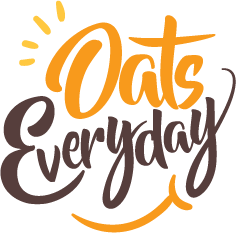Oats are one of the world’s healthiest grains that can help you make steps toward a healthier lifestyle change, or complement your already-active lifestyle.
To help you better get to know how including oats in your diet everyday may improve your overall health and help you achieve your nutritional goals, we’ve broken down the many health benefits of oats from A-Z.
Appetite Control
With complex carbohydrates, high fiber content and more protein than most other common grains, oats can leave you feeling full for hours after a meal. Studies suggest that eating oats can help improve appetite control by improving feelings of satisfaction and fullness.
Atherosclerosis
Atherosclerosis, commonly known as “hardening of the arteries,” occurs when fat and cholesterol build up in the arterial walls, forming hardened plaques which restrict blood flow. A heart-healthy diet containing fruits, vegetables and whole grains like oats, which are high in soluble fiber, can help slow and even reverse the process of atherosclerosis, by preventing the body from absorbing cholesterol and helping to keep your arteries flexible, elastic and healthy. 5,6,7 The fiber found in oats can also help manage hypertension, or high blood pressure, one of the major risk-factors of atherosclerosis.
Beta-Glucan Fiber
Oats are a naturally rich source of beta-glucan, a soluble fiber which can have many benefits for your health. Studies suggest beta-glucan can help improve heart health, lower cholesterol, lower the risk of developing type 2 diabetes and help those already living with diabetes manage their blood sugar. Studies also suggest that eating beta-glucan can help stimulate the immune system.
Cholesterol
Eating a diet sufficient in soluble fiber can slow or prevent the absorption of LDL, or “bad,” cholesterol by allowing it to be carried out of the body as waste, rather than entering the bloodstream. Excess cholesterol in the blood can build up in the arteries and harden, increasing the risk of cardiovascular disease. The Mayo Clinic recommends you aim for at least 5 to 10 grams of soluble fiber a day to protect your heart and lower your cholesterol numbers. For reference, just a half cup of dry oats provides 4 grams of fiber. Studies suggest eating two servings of oats per day can help lower cholesterol by 5.3 per cent in just six weeks, along with low fat diet and exercise.
Diabetes
The Glycemic Index (GI) is a ranking of carbohydrate-rich foods according to their effect on blood glucose levels. For example, a high GI food is one that is absorbed quickly, causing a rapid spike in blood sugar. Although high in carbs, oats are ranked medium-low on the glycemic index. This is because oats are full of complex carbohydrates, which digest slowly for a more even effect on blood sugar levels. Studies suggest eating a diabetes adapted diet containing oats can help lower insulin usage by up to 40%. In addition, the heart-health benefits of oats are particularly important for people managing diabetes as they are more susceptible to heart disease than people living without diabetes.
Dietary Fiber
Dietary fiber refers to fiber found in food. The high content of both soluble and insoluble fiber in oats is the source of many of their health benefits. Soluble fiber absorbs water and slows down digestion. Eating a diet high in fiber is inversely related to cardiovascular disease, obesity and type two diabetes. Getting enough insoluble fiber is also important for bowel health and can help to normalize bowel movements.
Gluten-Free Diets
Studies suggest incorporating oats into a gluten-free diet may enhance the diet’s nutritional value by helping to improve the body’s intake of vitamins and minerals. Oats can also help people on gluten-free diets meet their recommended daily intake of dietary fiber. Look for oat products that are certified gluten-free when making purchase decisions.
Heart Health
Consuming oats may help improve heart health by lowering c0holesterol and helping maintain a healthy weight. This can lower your risk of heart disease, stroke and obesity. Oats are a whole grain, which means they contain all three parts of the grain, including the fiber-rich bran. It’s this fiber content that makes whole grains like oats a good choice to help manage your heart health.
Iron
Oats are rich in iron, with a half cup dry oats providing about 20 per cent of your daily iron. Iron helps your body use energy more efficiently, leaving you feeling more awake and energized, and is an essential part of hemoglobin, the protein used by red blood cells to carry oxygen to the muscles and organs. Sufficient iron improves the body’s ability to send oxygen to muscles, which may lead to better athletic performance.
Metabolism
Although there is no miracle food to boost your metabolism, studies suggest maintaining a healthy diet incorporating fiber and whole grains like oats can help maintain a healthy metabolism. Because oats can help improve appetite control and help you feel full for longer after eating, they may help reduce overeating, important for a healthy metabolism.
Nutrients
Oats are one of the most nutrient-dense foods you can eat. In addition to providing complex carbs and beta-glucan fiber, oats also contain a wide profile of nutrients. A half cup of dry oats is a good source of the following vitamins and nutrients: Calcium, Copper, Folate, Iron, Manganese, Phosphorus, Potassium, Vitamin B1, Vitamin B3, Vitamin B5 and Vitamin B6.
Protein
One serving of rolled oats (1/2 cup dry) contains 5 grams of protein. While not a complete protein, oats contain more protein than most other common grains, with an amino acid score of 86/100. The higher a food’s amino acid score, the better quality of protein it provides. To make oats a complete protein, cook them in milk or serve with a dairy product like yogurt or cheese.24 Other complementary proteins include legumes, meat, fish, eggs and tree nuts, such as almonds and cashews.
Weight Management
A high-fiber content is one of the reasons eating oats is an effective tool for weight management. Fiber absorbs water to take up space in your stomach, which helps you feel full, reducing snacking and overeating. (See also Appetite Control) As well, studies suggest that eating cooked oats is associated with better diet quality, better nutrient intake and reduced risk of obesity in adults and children.

